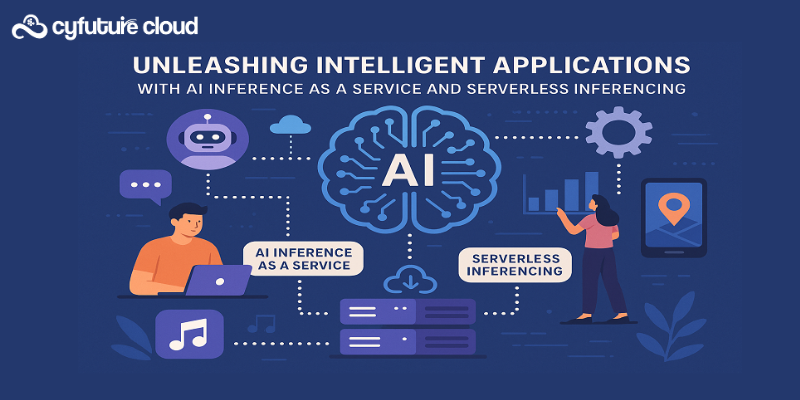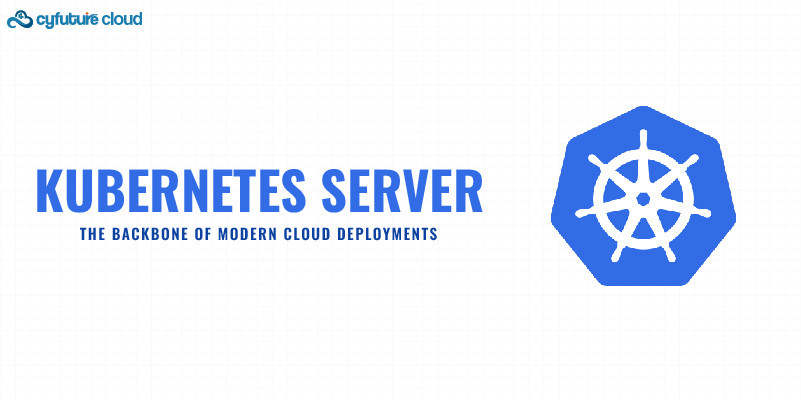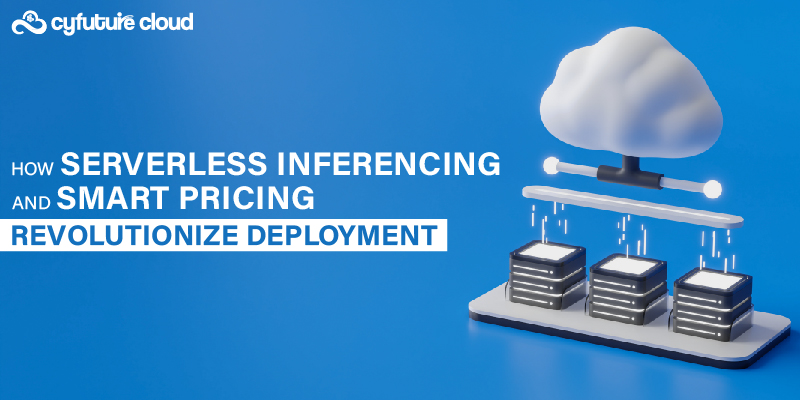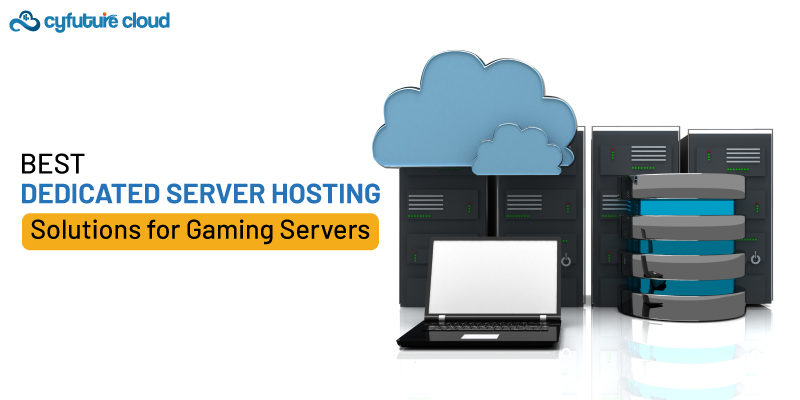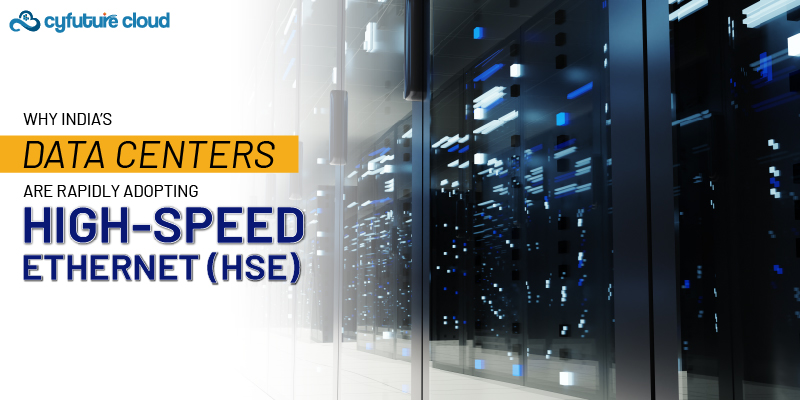Table of Contents
As organizations perpetually migrate to cloud-based hosting services, virtual machines and cloud-based security solutions like firewall-as-a-service (FWaaS) have grown in lockstep, resulting in the creation of cloud firewalls.
With every passing day, the number of cybercrimes has increased. Because of this individuals and companies must secure their information. However, they face many challenges in implementing the same.
Cloud firewalls are one such security device that can handle the flow of information between outside domains and your internal system. These systems, are often known as “Next-Generation Firewalls.
In terms of security measures, Cloud firewalls are an essential component of cloud computing. It provides a critical layer of protection for resources in the cloud from security threats.
According to Future Market Insights, during the forecast period, the cloud firewalls market is projected to grow at a CAGR of 16.7%. By 2032, the market is predicted to reach a valuation of US$ 10.4 billion, and as of 2022, the market holds a worth of US$ 2.2 billion.
In this blog post, we’ll cover everything you need to know about cloud firewalls, including how they work, the different types available, the benefits of using a cloud firewall, and best practices for implementing and using them.
A cloud-based firewall is a modern cybersecurity solution that provides network protection by filtering and monitoring internet traffic in the cloud. It offers businesses the advantage of centralized and scalable security, reducing the need for on-premises hardware while delivering real-time threat detection, prevention, and secure access controls to safeguard their digital assets from a wide range of online threats and attacks.
Understand Cloud-Based Firewall
A cloud firewall is a type of firewall that is implemented in a cloud computing environment, typically to protect the resources in the cloud from security threats.
Here are some potential points you could include in this blog post:
What is a Cloud Firewall?
A cloud firewall is a type of firewall that is deployed in a cloud computing environment. These cloud firewalls form a virtual barrier used to prevent malicious network traffic in the cloud.
A Cloud firewall is designed to protect virtual machines, containers, and functions, from security threats in the cloud.
It acts as a security product that acts as a shield and protects from unauthorized network traffic. Also, this protection is provided to different cloud components like Cloud Databases, Cloud CRM, and Email Cloud.
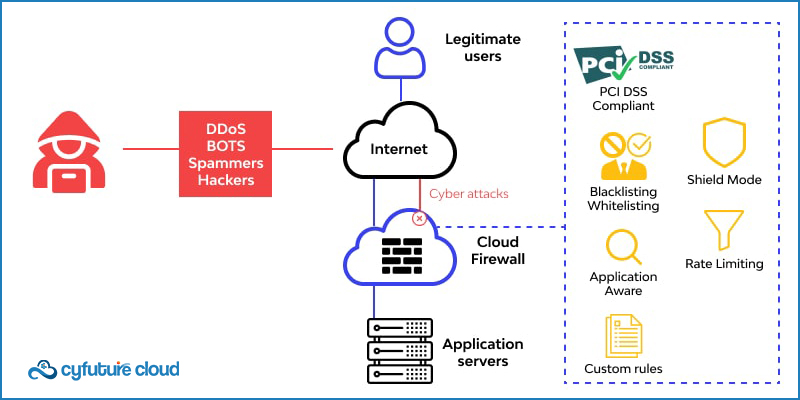
Difference Between Traditional Firewall and Cloud Firewall
There are several key differences between cloud firewalls and traditional firewalls:
| Parameters |
Traditional Firewall |
Cloud Firewall |
|
Location |
Traditional firewalls are typically implemented on-premises |
Cloud firewalls are implemented in the cloud |
|
Deployment |
Traditional firewalls are usually deployed and maintained by the organization. |
This type of firewall is typically deployed as a service by the cloud provider. |
|
Scalability |
This type of firewall may require manual configuration to scale up or down |
They are highly scalable and can be easily adjusted to meet the changing needs of an organization. |
|
Management |
It requires ongoing management and maintenance by the organization. |
They are fully managed and maintained by the cloud provider. |
|
Cost |
It requires upfront capital expenditure for hardware and software. |
Cloud firewalls are typically provided as a service by the cloud provider and are paid for on a pay-as-you-go or subscription basis. |
How Do Cloud Firewalls Work?
The working of both cloud firewalls and traditional firewalls is the same. The only thing which makes them different is that the cloud firewall is being hosted in a cloud environment.
Cloud firewalls work by inspecting incoming and outgoing network traffic and enforcing security policies to allow or block traffic based on predetermined rules. They can be configured to allow or block traffic based on various criteria, such as the source and destination of the traffic, the type of traffic, and the port being used.
Cloud firewalls can be implemented at various layers of the cloud computing stack, including the infrastructure, platform, and application layers.
- At the infrastructure layer, a cloud firewall can protect the underlying hardware, such as servers and storage, from external threats.
- At the platform layer, a cloud firewall protects the operating system and middleware, such as the virtualization layer, from external threats.
- At the application layer, a cloud firewall provides the shield to protect the application itself, such as a web application, from external threats.
A step-by-step explanation of how a typical cloud firewall works:
- A request is made to access a cloud resource: In this step, a request is made by a user or device to access a cloud resource, such as a file or application.
- Inspection of request by cloud firewall: The request for cloud resources inspects by the cloud firewall to determine whether it should be allowed or denied. To efficiently does this, the cloud firewall stringently checks the security rules and policies that have been configured for the cloud firewall.
- The cloud firewall allows or blocks the request: If the request is allowed, the cloud firewall forwards the request to the appropriate cloud resource. If the request is denied, the cloud firewall blocks the request and prevents it from reaching the cloud resource.
- Monitoring of network activity: After inspecting and filtering traffic, to detect suspicious behavior the cloud firewall can also monitor network activity. This includes unusual traffic patterns or attempts to access unauthorized resources.
- Provides secure access: The cloud firewall can provide secure access to your cloud resources by authenticating users and devices before allowing them access. It can also enforce access controls to ensure that only authorized users and devices can access your cloud resources.
- Alerts you to potential threats: If the cloud firewall detects any potential security threats, it can warn you and provide you with the required information so that you take appropriate action against them.
Types of Cloud Firewalls
There are several types of cloud firewalls available, including
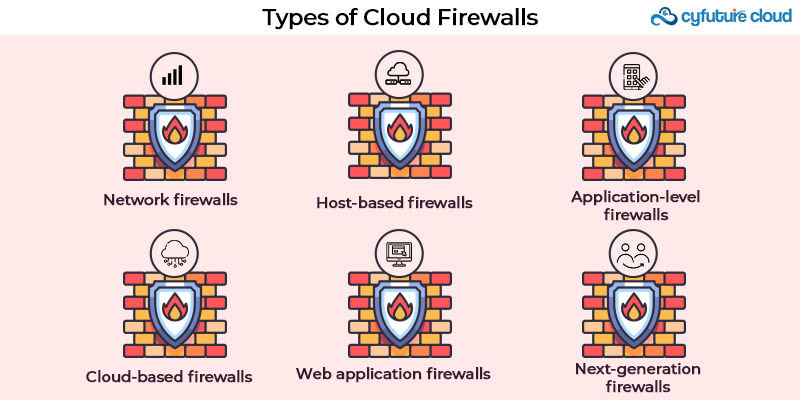
1. Network firewalls
The purpose of these firewalls is to protect a network by blocking or allowing incoming and outgoing traffic based on predetermined security rules. At this level, a firewall helps you to control and inspect all traffic entering and leaving a network.
2. Host-based firewalls
These firewalls are installed on individual computers or servers and protect them from unwanted traffic. Basically, they operate at the host level and can manage incoming and outgoing traffic for a particular device.
3. Application-level firewalls
These firewalls work at the application- level by protecting particular applications by inspecting and controlling traffic. Such firewalls can be used to protect against particular types of attacks, such as SQL injection or cross-site scripting (XSS).
4. Cloud-based firewalls
These firewalls are delivered as a service and are used to protect cloud-based resources. They operate at the network level and can be configured to allow or block traffic based on security rules.
5. Web application firewalls
These firewalls protect web-based applications from attacks such as cross-site scripting (XSS) and SQL injection. They operate at the web application level and can be used to protect against specific types of attacks.
6. Next-generation firewalls
These firewalls are the amalgamation of the traditional as well as the technologically advanced additional features such as intrusion prevention and malware protection. They can be used to protect against a wide range of threats and are often used in enterprise environments.
Choosing the Right Cloud Firewall
There are several factors you need to consider if you’re planning to choose a cloud firewall. These include:
Compatibility with your cloud environment: It is one of the substantial factors to consider a cloud firewall. You need to check the compatibility of the cloud firewall with your cloud environment, whether it’s AWS, Azure, or GCP.
Features and capabilities: The features and capabilities offered by cloud firewalls vary with the type of firewall you use. For example, some firewalls may offer deep packet inspection (DPI) while others do not. Consider the specific features and capabilities that are important to your organization.
Usability: Prefer to choose an easy-to-use and configure cloud firewall. This can help you in saving the time and resources of your organization in the long run.
Cost: Consider the cost of the cloud firewall and compare it to your budget and other available options.
Support: Choose a cloud firewall that offers good support and maintenance options, such as online documentation and a knowledgeable support team.
Benefits of Using a Cloud Firewall
Let us delve into the several benefits of a cloud firewall.
1. Cost savings
One of the main benefits of cloud firewalls is that they are delivered as a service, so there is no need to purchase and maintain hardware or software. This can result in significant cost savings compared to traditional firewalls, which require upfront capital expenditure and ongoing maintenance.
2. Scalability
Cloud firewalls can be easily scaled up or down to meet changing needs, making them a flexible solution for organizations with fluctuating traffic. This can be particularly useful for organizations that experience seasonal spikes in traffic, as they can scale their firewall resources to match the increased demand.
3. Ease of use
Cloud firewalls are typically easy to set up and manage, as they are managed by a third party and do not require on-premises hardware or software installation. This can make them a convenient solution for organizations that do not have the resources or expertise to manage their own firewall.
4. Improved security
Cloud firewalls can provide a high level of security for cloud-based resources, as they can be configured to block or allow traffic based on a set of security rules. This can help protect against a wide range of threats, including cyber attacks, malware, and unauthorized access.
5. Centralized management
Cloud firewalls can be managed from a central location, which can make it easier to enforce security policies and monitor activity. This can be particularly useful for organizations with distributed networks or multiple cloud-based resources.
6. Automatic updates
Cloud firewalls are typically updated automatically with the latest security features and patches, ensuring that they are always up to date and effective at protecting against the latest threats. This can help organizations stay ahead of emerging threats and maintain a high level of security.
7. Improved performance
Cloud firewalls can help improve the performance of cloud-based resources by offloading security processing to the cloud. This can allow resources to operate more efficiently and handle a higher volume of traffic.
8. Improved compliance
Cloud firewalls can help organizations meet regulatory compliance requirements by providing a secure and controlled environment for sensitive data.
9. Flexibility
Cloud firewalls can be easily customized to meet the specific needs and requirements of an organization. This can make them a flexible and adaptable solution for organizations with diverse security needs.
10. Integration with other security tools
Cloud firewalls can be easily integrated with other security tools and services, such as intrusion prevention systems (IPS) and vulnerability scanners. This can provide a more comprehensive security solution and improve the overall effectiveness of an organization’s security posture.
11. 24/7 monitoring and support
Many cloud firewall providers offer 24/7 monitoring and support, which can help ensure that an organization’s security needs are met around the clock. This can be particularly useful for organizations that need to maintain a high level of security at all times.
Examples of Cloud Firewall
There are several cloud service providers in India who also provide cloud firewall service to the users. That includes:
- AWS Shield: This is a Amazon Web Services (AWS) service that protects against distributed denial of service (DDoS) attacks, network layer attacks, and application layer attacks.
- Azure Firewall: This Microsoft Azure service provides network-level protection for Azure resources.
- Google Cloud Armor: Google cloud provides its cloud firewall service to provides protection against DDoS protection and application-level for Google Cloud resources.
- Fortinet FortiGate Cloud: Fortinet is the service provider of this cloud firewall service. It provides network-level protection for cloud-based resources.
- Zscaler Cloud Firewall: This service provides network-level protection for cloud-based resources.
- Cloudflare: This cloud firewall service protects against DDoS attacks and other types of cyber threats. It includes features such as a web application firewall, SSL/TLS encryption, and DDoS protection.
- Barracuda CloudGen Firewall: This is a cloud firewall service offered by Barracuda Network that provides network-level protection for cloud-based resources.
- Sophos Cloud Firewall: This cloud firewall solution is offered by Sophos that protects against cyber threats.
Choose Your Cloud-Based Firewall Wisely!
In terms of security, a cloud firewall is an essential component of this age of digital transformation for any organization. It protects against cyber threats and ensures that incoming and outgoing traffic complies with security policies.
But among several types of cloud firewalls choosing the right kind of solution for your organization is a crucial matter. That’s why, it is important to consider compatibility factors, features, capabilities, and other factors of the cloud firewall. Because they can prove to be a valuable asset for your network security parameter.
Thus, be sure while choosing your cloud-based firewall.
Recent Post
Send this to a friend

 Server Colocation
Server Colocation CDN Network
CDN Network Linux Cloud Hosting
Linux Cloud Hosting Kubernetes
Kubernetes Pricing Calculator
Pricing Calculator
 Power
Power
 Utilities
Utilities VMware Private Cloud
VMware Private Cloud VMware on AWS
VMware on AWS VMware on Azure
VMware on Azure Service Level Agreement
Service Level Agreement 

